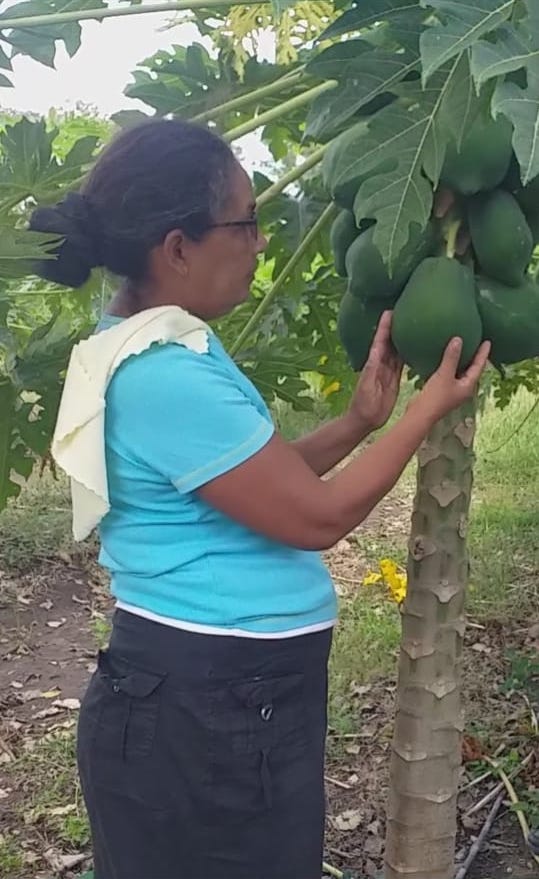Ramona admiring her papayas.
Growing Hope
Ramona shares about what her farm used to look like before joining CEPAD’s Sustainable Agriculture Program.
“We don’t typically grow vegetables in our region due to the soil, climate, and culture. We used to only be able to buy these things.
We used to plant corn, beans, and sorghum, using traditional methods. When we cut away the dried stalks after harvest, we would burn them. We thought it enriched the soil. When we would see a pest, we would run and get the insecticide with poison to kill them. We would mix up the soil un it was very fine, not knowing that the wind would blow away these precious nutrients or that the rain would wash away the rich top soil. We did all these things not knowing the damage we were doing.”
Ramona recognizes the differences she sees now.
“In CEPAD’s Sustainable Farming Program, I’ve attended eight workshops so far on soil and water conservation, water reservoirs, pest management, plant nurseries, crop diversification, seed reproduction, and more. All of what we have learned has been good, helping to develop our farms using natural resources-making our own compost and insecticide to use.
From the workshops received, now I cut away any weeds and let them dry out or put them in my compost, I don’t burn them. To help with water scarcity, I’m constructing a micro-reservoir to capture and store 3,500 liters of water to help water my plants, even in the dry season.
The crop diversification benefits me, because if the rainy season is very strong, my plants can tolerate it, especially the plantains and papaya. If the rainy season isn’t very strong, then I have other plants that don’t need as much water, like yucca. The crops that have a shorter growth cycle also meet our dietary needs like cucumber, squash, and corn.”
With all of these new changes, Ramona is seeing the difference and is optimistic about the future.
“My greatest satisfaction is having diverse foods, 15 crop varieties, some of which include: pepper, tomatoes, radish, squash, cucumber, watermelon, carrots, corn, yucca, quequisque and malanga (root vegetables), passionfruit, pineapple, oranges, and lemons. My family and I have an improved diet.
I have hope that my land will produce food all the time. I believe I’m better prepared to be less affected by climate change.”
Thank YOU for providing Ramona and her family with a better future for years to come. To give other small farmers in rural Nicaragua the same opportunity, you can partner with CEPAD here.



